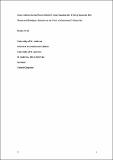Peace without social reconciliation? Understanding the trial of Generals Ríos Montt and Rodriguez Sánchez in the wake of Guatemala’s genocide
Abstract
This article argues that the legal trial against Generals Efraín Ríos Montt and José Mauricio Rodriguez Sánchez for genocide and crimes against humanity has evidenced the interplay between the complex factors shaping post-conflict reconstruction and social reconciliation in post-genocide Guatemala, and, ultimately, the disjunctive impact of the country’s peace process. The ‘genocide trial’ then is more than a legal process in that it represents a thermometer for Guatemala’s peace process and, ultimately, for testing the nature and stability of the post-genocide/post-conflict conjuncture. Interiorization of human rights frameworks and justice mechanisms by indigenous and human rights activists, including of the Genocide Convention, has consolidated a partial rights culture. However, the trial and the overturning of its verdict have simultaneously evidenced the instability, fragility and disjunctive nature of post-conflict peace and the continuing impact of the profound legacy of the genocide and of social authoritarianism. The article argues that while the trial has wielded broad impact within both state institutions and society, consolidating indigenous political actors, it has simultaneously fortified spoilers and evidenced indigenous collective memory as a fragmented and contested sphere.
Citation
Brett , R 2016 , ' Peace without social reconciliation? Understanding the trial of Generals Ríos Montt and Rodriguez Sánchez in the wake of Guatemala’s genocide ' , Journal of Genocide Research , vol. 18 , no. 2-3 , pp. 285-303 . https://doi.org/10.1080/14623528.2016.1186955
Publication
Journal of Genocide Research
Status
Peer reviewed
ISSN
1462-3528Type
Journal article
Description
I wish to thank Bridget Conley-Zilkic and Alex de Waal at the World Peace Foundation for their financial support.Collections
Items in the St Andrews Research Repository are protected by copyright, with all rights reserved, unless otherwise indicated.

